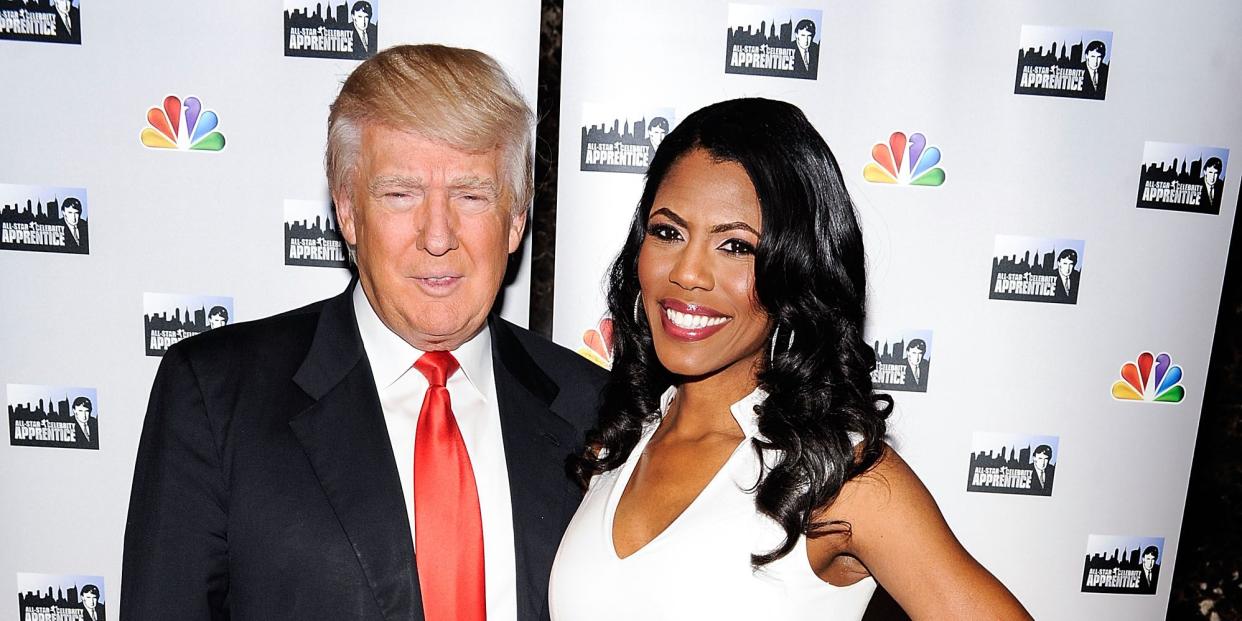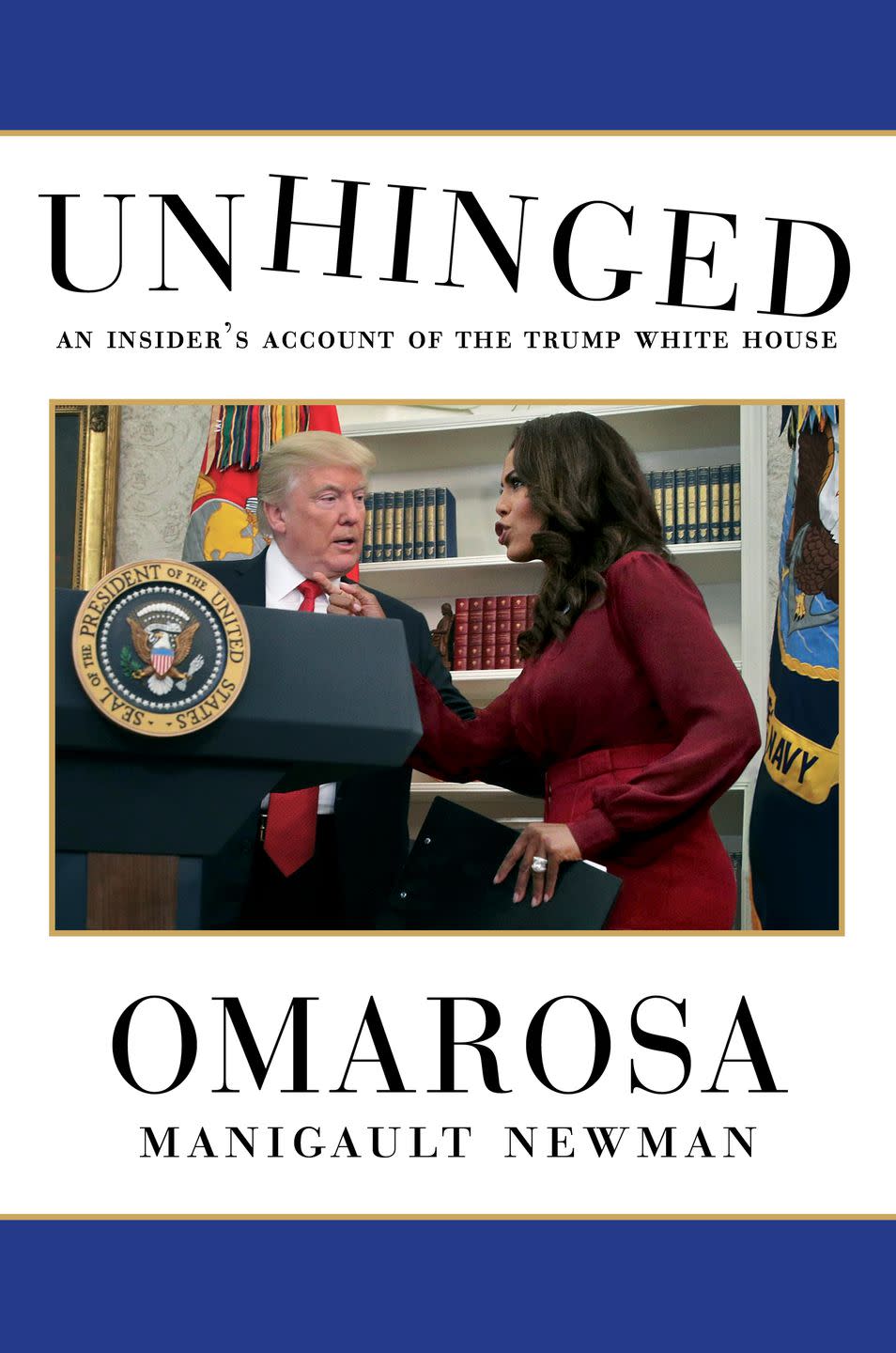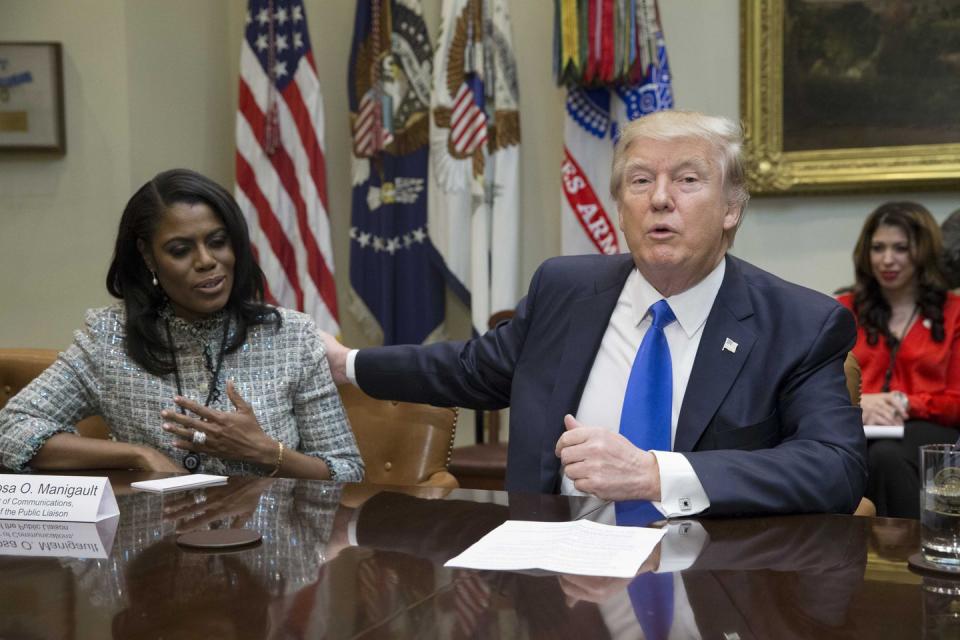Omarosa Despises Donald Trump. For Now.

Omarosa Manigault Newman loathes Donald Trump. Or at least, that’s what she expects us to believe in her new book Unhinged: An Insider's Account of the Trump White House.
Page after page, she tells us that Trump is unstable, crazy, and evil. The president, Omarosa declares, is a narcissist, a racist and a misogynist who displays sociopathic tendencies. And over the course of their fifteen-year working relationship, she insists, it became increasingly clear to her just how dangerous he was, and still is.
In reality, once you push past the revisionist history of the book, it’s apparent that the memoir is all about Omarosa’s understanding of power and her pursuit of it. And though she truly appears to believe that Trump is “unhinged” and dangerous, Omarosa also still admires his power and influence.
Throughout the duration of their nearly two-decade relationship, Omarosa didn’t just work for Trump. She studied him, emulated him, and modeled herself after him-adopting his tactics, parts of his personality, his bravado, and his penchant for calculated media theatrics. For Omarosa, Trump was power and Omarosa wanted power.
Once you see that Unhinged is about influence, it changes the entire framing of the book. Omarosa's work and admiration for Trump is a ruthless byproduct of how she views inequality and survival in a country she sees as fundamentally rigged against her race, gender, and background. She documents dozens of instances of feeling powerless, including growing up in extreme poverty in an Ohio housing project, and the childhood trauma of her father’s murder (and later, her brother’s murder).
For a woman who constantly felt disempowered early in her life, access to Trump made her feel powerful. She insists, for instance, that she joined Trump’s campaign team as his Director of African American Outreach in 2015 only after being snubbed by Hillary Clinton’s fundraising team; after Trump calls her personally, she accepts the job-not out of loyalty to her longtime mentor, but because a powerful billionaire wanted her as part of his political inner circle.

Omarosa constantly reminds us that she maintained this “prized” position as one of Trump’s highest-ranking black staffers-first as Director of African American outreach on the campaign trail, and later as an Assistant to the President and the Director of Communications for the Office of the Public Liaison. In one passage, she recounts her happiness at traveling with Trump to her hometown of Youngstown, Ohio for a MAGA rally in 2017: “There I was, a kid from the Westlake projects, flying into town on Air Force One, driving through the streets where I grew up in the presidential motorcade, to be the guest of honor in the VIP box,” at a “rally for the man I helped get elected.”
It’s an eye-opening story, especially when you realize that in a town where nearly half the population is black, Omarosa was one of the only African Americans at an all-white rally. Things get even stickier when you consider that by this point in the book's narrative, Omarosa has decided that the White House is a racist, toxic wasteland, led by a president who has delighted in using racial minorities as figurative punching bags, and who gave his officials the go-ahead to craft policies aimed at punishing the country’s most vulnerable populations.
Unhinged is littered with these kinds of scenarios. Most of them will feel mundane, given that much of what Omarosa shares with us, we already know (Paul Manafort is corrupt! Steve Bannon is racist! Donald Trump and his staffers use racial slurs!). Even so, some portions of the book are cutthroat, containing enough petty shade, gossip, and drama to satisfy even the most die-hard of Real Housewives fan. At one point, Omarosa suggests that Donald Trump is losing his mental faculties and is suffering from Diet-Coke induced dementia.
Few people emerge unscathed, with Omarosa reserving some of her harshest digs for Mike Pence (creep and homophobic), Kellyanne Conway (who she sees as weak and ineffective) Hope Hicks (ditzy, incompetent, and powerless), and General John Kelly (power-hungry, racist, and cruel).
The book does make a few startling and concerning accusations, such as Omarosa’s claim that the Trump campaign budgeted nothing for black engagement efforts during the 2016 contest, preferring instead to concentrate on depressing black voter turnout through “diversity media buys.” There’s also her alarming insinuation that Paula White (Trump’s spiritual advisor) may have engaged in a sexual relationship with the president as a means of influencing his personnel and policy decisions. Omarosa accuses Education Secretary Betsy DeVos of repeated instances of corruption, fraud, and racism as well, including an alleged incident wherein DeVos casually told Omarosa that black students weren’t smart enough to understand the White House’s educational agenda.
For many, especially African Americans, there are the types of moments that have sustained a kind of collective loathing of not only of Donald Trump and his administration, but of Omarosa too. When Jay-Z boasts that he’s “Lebron James to you Omarosas” in 2018’s “Black Effect,” he’s placing that community distain into the clearest of terms: you’re either for the people or against them. And if you’re working for Donald Trump, well, then you’re actively working against us.

Omarosa tries to counter these accusations by offering excuses ranging from naiveté to having a blind spot for Trump. In another instance, she cynically argues that as a black professional, racism is just a way of life: “If every black person quit his or her job because someone in the workplace was racist, not many of us would be employed.” A few sections later, she writes, “You don’t walk away from the table, because if you’re not at the table, you’re on the menu.” Unsurprisingly, her pleas are unconvincing. A seat at the table is meaningless, if your boss is dead-set on serving you and your community for lunch.
Omarosa is most persuasive, however, when she admits that her willingness to serve as Trump’s chief-racial apologist was her way of accessing power (whether it was for herself or her community, or some combination of the two, isn’t clear). “Donald and I had a symbiotic relationship,” she details in one chapter. “I gave him ratings, and he gave me, a woman of color, opportunities, again and again, which, in turn, gave him someone to point to and say, ‘I’m not a racist misogynist! Look at all I’ve done for Omarosa!”
It’s an unbalanced and noxious relationship that would persist until December 2017, when Kelly fired Omarosa (apparently with Trump’s blessing), effectively destroying her access to the upper tiers of power. It also marked the beginning of a long and increasingly nasty public divorce between the president and the former reality star. But while Omarosa may have been excommunicated from the world of Trump, she hasn’t forgotten his lessons on power and control.
With the release of her story, and her accompanying media blitz, she’s put those lessons into play, triggering a vicious public attack from the President of the United States, who on Tuesday, took to his twitter account to call Omarosa a “crazed, crying lowlife” and a “dog.” In an administration that had a long history of targeting and attacking black people, Omarosa was never the exception. It’s a brutal truth that she seems to have understood and anticipated. And now, as she’s always done, she’s using it to her advantage.
('You Might Also Like',)